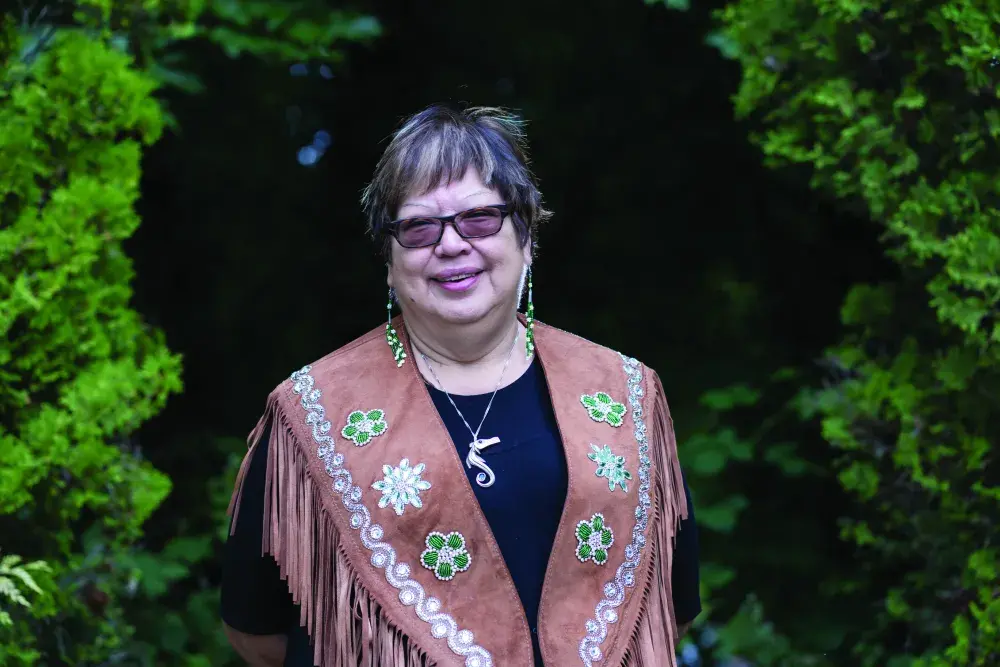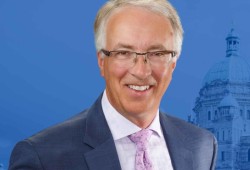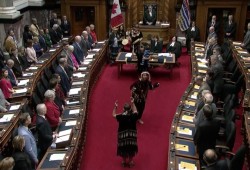With voters preparing to head to the polls for the BC General Election, a Nuu-chah-nulth leader shared her thoughts on the top two candidates running for premier.
NTC President Coly-e-iis, Dr. Judith Sayers, has been involved in Nuu-chah-nulth politics for many years. A member of the Hupacasath First Nation, Sayers was elected as the president of the Nuu-chah-nulth Tribal Council in September 2017 and is a long-time advocate for the promotion and protection of First Nations rights and title.
Also in 2017, John Horgan, leader of the B.C. NDP, narrowly defeated Christy Clark’s BC Liberal government to win the provincial election. Under Horgan, the NDP party retained power in the 2020 provincial election, defeating runner up Liberal candidate Andrew Wilkinson by a more decisive margin than in the previous votes.
In the summer of 2022, Premier Horgan announced he would be stepping down after receiving treatment for cancer. David Eby was elected within the party to step in as NDP leader in October 2022. So, over the past four years, the NDP has been under the leadership of first Horgan, then Eby.
NTC President Cloy-e-iis, Judith Sayers, said she would rate the current NDP government’s performance at seven out of 10.
“They have tried to work hard with First Nations on implementing UNDRIP since they passed the law,” she said of the current NDP government.
Back in 2019 the province passed the Declaration on the Rights of Indigenous Peoples Act, which sets to align B.C.’s laws with the United Nations Declaration on the Rights of Indigenous Peoples. When DRIPA was passed in B.C., Sayers recalled that the current Conservative Leader John Rustad, who was an MLA with the Liberal party at the time, voted for it. But in a statement made on Feb.1 Rustad said that the legislation must be repealed.
“He has started a political war with First Nations by saying he will repeal an act that First Nations have worked so hard to implement and change things for the better in many different ways,” said Sayers. “He is not to be trusted when he flips on his positions depending on what can benefit him politically.”
Over the past few years progress has been made with DRIPA in place. Cloy-e-iis says there are now tables looking at changing certain laws.
“Such as the Heritage Conservation Act, the Police Act and the Anti Racism Act,” she noted.
Additional developments include the Haida Title Act, which recognizes the nation’s jurisdiction over Haida Gwaii.
But more work remains to complete outstanding First Nations title claims in the province.
Polls leading up to the election show the Conservatives to be very close to the NDP’s share of the popular vote, with some calculations having the opposing parties with identical numbers. Some fear that if the Conservatives are elected, or have a large number of seats in the next Legislative Assembly, progress First Nations and the province have made in recognizing rights and title could be put in jeopardy. On Sept. 30 a statement from the First Nations Leadership Council raised this alarm. The council is comprised of the political executives of the BC Assembly of First Nations, the First Nations Summit and the Union of BC Indian Chiefs.
“The FNLC is extremely concerned by John Rustad's ongoing efforts to pit British Columbians against each other - he showed this with the Haida title bill when he spoke in favour of the bill and then turned around and voted against it,” stated the leadership council. “The FNLC stresses that the recent years have included extremely hard work by First Nations and the government to make progress based on cooperation and working together. We've moved forward on title recognition, revenue sharing, child and family services, housing on reserve and in many other ways. We can't go backwards and undo the Declaration Act, which underpins our current work, and the years of progress we have made together.”
Sayers said this outcome would be very concerning for her with all the other First Nations titles that have yet to be resolved.
“John Rustad has turned his back on the Haida and Haida title even when he said he supported it,” she said.
While the NDP government hasn’t mastered how to work with First Nations, “they are trying hard and, it’s a lot better than it was,” she added.
In the future, Sayers hope to see Nuu-chah-nulth-aht having more shared management over their land, inland waters and decision making over forestry.
“Free prior and informed consent must be required before projects in their territories, including mining and pipelines or any other projects that can affect their lands and resources,” she said.
When it comes to human services, Sayers says Nuu-chah-nulth communities need more resources to deal with the mental health and opioid crisis. There have been some housing projects in some Nuu-chah-nulth communities, but more is needed.
“Nuu-chah-nulth need more homes for the homeless and the ability to meet the social needs of those that don’t have a home,” she said.
“I hope everyone gets out and votes as there is a lot at stake in the future,” said Sayers.
According to Elections BC, advance voting for British Columbia’s 43rd Provincial General Election begins Thursday, October 10.
There are six days of advance voting for this election, from Thursday, October 10 to Sunday, October 13, and from Tuesday, October 15 to Wednesday, October 16. Advance voting places will be open from 8 a.m. to 8 p.m.
Advance voting locations and district electoral offices will be closed on Monday, October 14, for the Thanksgiving holiday.
Voters can find information about where to vote on Elections BC’s website or call Elections BC at 1-800-661-8683.
Elections BC will publish voting turnout statistics throughout the advance voting period. These statistics will be available on the Elections BC website here.



